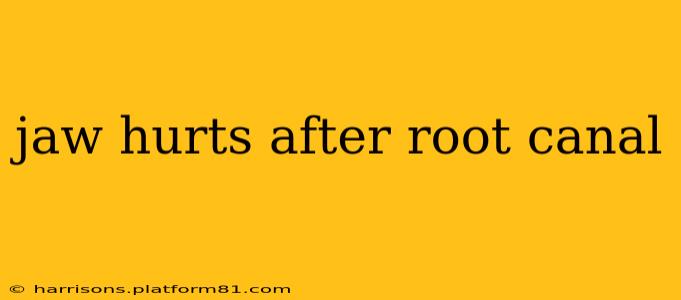A root canal, while designed to alleviate tooth pain, can sometimes leave you with jaw discomfort afterward. This is not uncommon, and understanding why it happens, along with how to manage it, is crucial for a smooth recovery. This comprehensive guide addresses common concerns and provides valuable insights into managing post-root canal jaw pain.
Why Does My Jaw Hurt After a Root Canal?
Several factors can contribute to jaw pain following a root canal. The procedure itself involves significant manipulation of the tooth and surrounding tissues, which can cause temporary inflammation and soreness. The anesthesia used may also cause some residual discomfort as it wears off. Furthermore, the post-procedure healing process often involves some level of inflammation that can radiate to the jaw.
Is Jaw Pain After a Root Canal Normal?
While some level of jaw discomfort is considered normal in the initial days following a root canal, persistent or severe pain warrants attention. Mild aches or tenderness are generally expected and often subside within a few days with proper care. However, if the pain intensifies, spreads, or is accompanied by other symptoms, it's crucial to contact your dentist immediately.
How Long Does Jaw Pain After a Root Canal Last?
The duration of jaw pain after a root canal varies greatly depending on individual healing responses and the extent of the procedure. Most patients experience only mild discomfort that resolves within a week. However, some might experience lingering tenderness for a couple of weeks. If the pain persists beyond a few weeks, or worsens, seeking professional dental advice is crucial.
What Can I Do to Relieve Jaw Pain After a Root Canal?
Managing post-root canal jaw pain often involves simple, at-home remedies. Over-the-counter pain relievers like ibuprofen or acetaminophen can effectively manage mild to moderate pain. Applying ice packs to the affected area in 20-minute intervals can help reduce inflammation. Gentle jaw exercises, as recommended by your dentist, can also aid in recovery. Resting your jaw and avoiding strenuous chewing are also essential.
When Should I Call My Dentist About Jaw Pain After a Root Canal?
You should contact your dentist immediately if:
- The pain is severe or unbearable. Pain medication is not providing sufficient relief.
- The pain is accompanied by swelling or fever. These could indicate an infection.
- The pain radiates to other areas of the face or neck. This could signal a more serious complication.
- The pain lasts longer than a couple of weeks. Persistent pain suggests a potential issue requires attention.
Can a Root Canal Cause TMJ Problems?
While not a direct cause, a root canal can exacerbate pre-existing temporomandibular joint (TMJ) disorders. The inflammation from the procedure, coupled with the potential for altered bite mechanics from the temporary crown (if applicable), might contribute to TMJ pain. If you experience jaw clicking, popping, or locking, along with the root canal pain, you should inform your dentist. They may refer you to an orthodontist or TMJ specialist.
How Can I Prevent Jaw Pain After a Root Canal?
Careful communication with your dentist before and after the procedure is crucial. Following their post-operative instructions precisely is key to minimizing the risk of complications and pain. This includes adhering to dietary recommendations, managing pain medication appropriately, and attending follow-up appointments.
Conclusion
Jaw pain after a root canal is a relatively common experience, but its persistence or severity should never be ignored. Following your dentist's advice, utilizing appropriate pain management techniques, and contacting your dentist immediately if you experience unusual or persistent pain will ensure the best possible outcome and a comfortable recovery. Remember, open communication with your dental professional is crucial for effective treatment and pain management.
